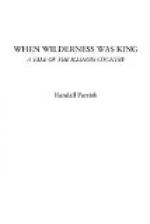My mother, her sleeves rolled high over her round white arms, was in the dark interior of the milk-house as I passed, and spoke to me laughingly; and I could perceive my father sitting in his great splint-bottomed chair just within the front doorway, and I marked how the slight current of air toyed with his long gray beard. The old Bible lay wide open upon his knee; yet his eyes were resting upon the dark green of the woods that skirted our clearing. I wondered, as I quaffed the cool sweet water at the spring, if he was dreaming again of those old days when he had been a man among men. How distinct in each detail the memory of it remains! The blue sky held but one fleecy white cloud in all its wide arch; it seemed as if the curling film of smoke rising from our chimney had but gathered there and hung suspended to render the azure more pronounced. A robin peeked impudently at me from an oak limb, and a roguish gray squirrel chattered along the low ridge-pole, with seeming willingness to make friends, until Rover, suddenly spying me, sprang hastily around the comer of the house to lick my hand, with glad barkings and a frantic effort to wave the stub of his poor old tail. It was such a homely, quiet scene, there in the heart of the backwoods, one I had known unchanged so long, that I little dreamed it was soon to witness the turning over of a page of destiny in my life, that almost from that hour I was to sever every relation of the past, and be sent forth to buffet with the rough world alone.
There were no roads, in those days, along that valley of the upper Maumee,—merely faint bridle-paths, following ancient Indian trails through dense woods or across narrow strips of prairie land; yet as I hung the gourd back on its wooden peg, and lifted my eyes carelessly to the northward, I saw a horseman riding slowly toward the house along the river bank. There were flying rumors of coming Indian outbreaks along the fringe of border settlements; but my young eyes were keen, and after the first quick thrill of suspicion I knew the approaching stranger to be of white blood, although his apparel was scarcely less uncivilized than that of the savage. Yet so unusual were visitors, that I grasped a gun from its pegs in the kitchen, and called warningly to my mother as I passed on to meet the new-comer.
He was a very large and powerful man, with a matted black beard and an extremely prominent nose. A long rifle was slung at his back, and the heavy bay horse he bestrode bore unmistakable signs of hard travelling. As he approached, Rover, spying him, sprang out savagely; but I caught and held him with firm grip, for to strangers he was ever a surly brute.
“Is this yere Major Wayland’s place?” the man questioned, in a deep, gruff voice, reining in his tired horse, and carelessly flinging one booted foot across the animal’s neck as he faced me.
“Yes,” I responded with caution, for we were somewhat suspicious of stray travellers in those days, and the man’s features were not pleasing. “The Major lives here, and I am his son.”




